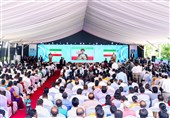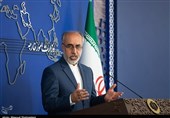Iran Wants Peace, Prosperity in Afghanistan: Envoy
TEHRAN (Tasnim) – Iran’s Ambassador to the United Nations Gholam Ali Khoshroo said the Islamic Republic is eager to see peace and prosperity in neighboring Afghanistan.
“Iran is indeed very eager to see a peaceful and prosperous Afghanistan as its neighbor, security in Afghanistan directly and indirectly affects security in our borders and the region,” Khoshroo said on Wednesday at a UN Security Council debate on the situation in Afghanistan.
Following is the full text of his speech:
In the Name of God, the most Compassionate, the most Merciful
Mr. President
Let me begin by expressing my heartfelt condolences and condemnations for the most recent terrorist attacks that took place during the Muslim holy month of Ramadan in Kabul specially on May 31, 2017, which resulted in more than 80 deaths and hundreds injured, considerable damage to the surrounding area and some diplomatic facilities, including ours, as well as the attack on a Shiite mosque on June 15.
I would like to express my appreciations to Bolivia for organizing this debate, the distinguished Ambassador of Afghanistan for his statement, as well as Mr. Yamamoto, Special Representative of the Secretary-General for Afghanistan and head of the United Nations Assistance Mission in Afghanistan (UNAMA) for his briefing and presenting SG’s latest Report, as contained in document S/2017/508 .
As the Secretary General observed during his first visit to Kabul, Peace remains the foundation for Afghanistan's sustainable development, at the same time, according to the SG’s report the security in Afghanistan remained extremely volatile with 6,252 security-related incidents between March 1 and May 31 this year, showing a two percent increase comparing to last year. This is the highest total ever recorded for this period of time since 2001.
More than a decade after its invasion, Afghanistan, the region and the world is not any safer. Deteriorating security in Afghanistan has its deeper roots and cannot be addressed solely through military buildup.
The Taliban, Daesh and its offshoots such as ISIL-KP continue their heinous attacks against the civilian population, they are reinforcing and recruiting and continuing complex attacks such as the May 17 and May 31 attacks in Jalalabad and Kabul. The proliferation of terrorist groups in the Afghan territory necessitates concerted international effort on counter-terrorism. We need to deal with this increasing threat in a very comprehensive and resolute manner. The sustained support of the international community for the Afghan National Unity Government is needed more than ever to help the Afghan government in its fight against terrorism and extremism and those who have created and keep supporting them.
Our support for the Afghan National Unity Government is unrelenting. We welcome any achievement on the path to an Afghan-owned and Afghan-led peace process leading to lasting and comprehensive peace in the country and the region. Progress achieved in the implementation of the peace agreement between the government and Hizb-i Islami is an indication of the government’s will to establish peace.
Iran is indeed very eager to see a peaceful and prosperous Afghanistan as its neighbor. Security in Afghanistan directly and indirectly affects security in our borders and the region. It was in this context that Iran welcomed and participated on both conferences hosted by the Russian Federation on April 14 in Moscow as well as the Kabul conference hosted by the Afghan government on June 6.
Mr. President
Strengthening our regional cooperation with Afghanistan is a priority and a major pathway to consolidate peace and economic development and stability in the region. Trilateral Chabahar agreement between Iran, India and Afghanistan and Khaf- Herat Railway project are two major transit projects underway. These projects have the capacity to change the regional economic perspectives of Afghanistan. Such regional infrastructure initiatives can serve as an important way towards prosperity and stability in Afghanistan.
On anti-Narcotics efforts, the 43 percent rise in opium production is a disturbing trend for us in the region and for the world. Any increase in narcotics is a reflection of the prevailing insecurity and poverty.
Iran is a frontline country in the war against narcotics. We have offered alternative cultivation as well as alternative livelihood plans to dissuade Afghan farmers from opium cultivation. Stronger international cooperation and support and commitment from donors, Afghan authorities and UNODC is essential to deter the menace of narcotics as a social health challenge and more importantly, as a major source of income for recruitment of extremist and terrorists groups. Iran participated in the Sixth Steering Committee Meeting of the Regional Program for Afghanistan and Neighboring Countries, hosted by the government of Kazakhstan in Astana on April 6. Representatives from the drug control agencies, ministries of interior and foreign affairs from the eight Regional Program Countries, as well as donors, international partners and organizations reviewed the achievements made in 2016 and identified priorities for 2017. Participants underlined the positive impact of strengthened regional cooperation and joint responses to countering illicit drugs and transnational organized crimes.
Iran continues to host thousands of Afghan refugees for more than three decades. They have access to mostly subsidized services equally available to Iranians, including basic commodities, public health and public education. We also continue to participate in the work of Tripartite Commission in order to plan for voluntary, safe, dignified and gradual repatriation of Afghan refugees. Success in voluntary repatriation first and foremost depends on providing the reasonable needs of repatriated refugees in Afghanistan, and underscores the need for more international support. Stronger coordinated approach between the government, donors and the United Nations and an overall strategy for addressing the combined needs of the displaced and returnees are crucial in making the repatriation of Afghan refugees more successful.
Mr. President
We support UNAMA as well as UN agencies in their efforts to provide development and reconstruction assistance to Afghanistan through a genuine commitment by the United Nations to a sustained partnership with Afghanistan. We need to utilize the UNAMA mandate and its good offices for strengthening national institutions and capacities in priority areas as requested by the Afghan government.
I thank you Mr. President





